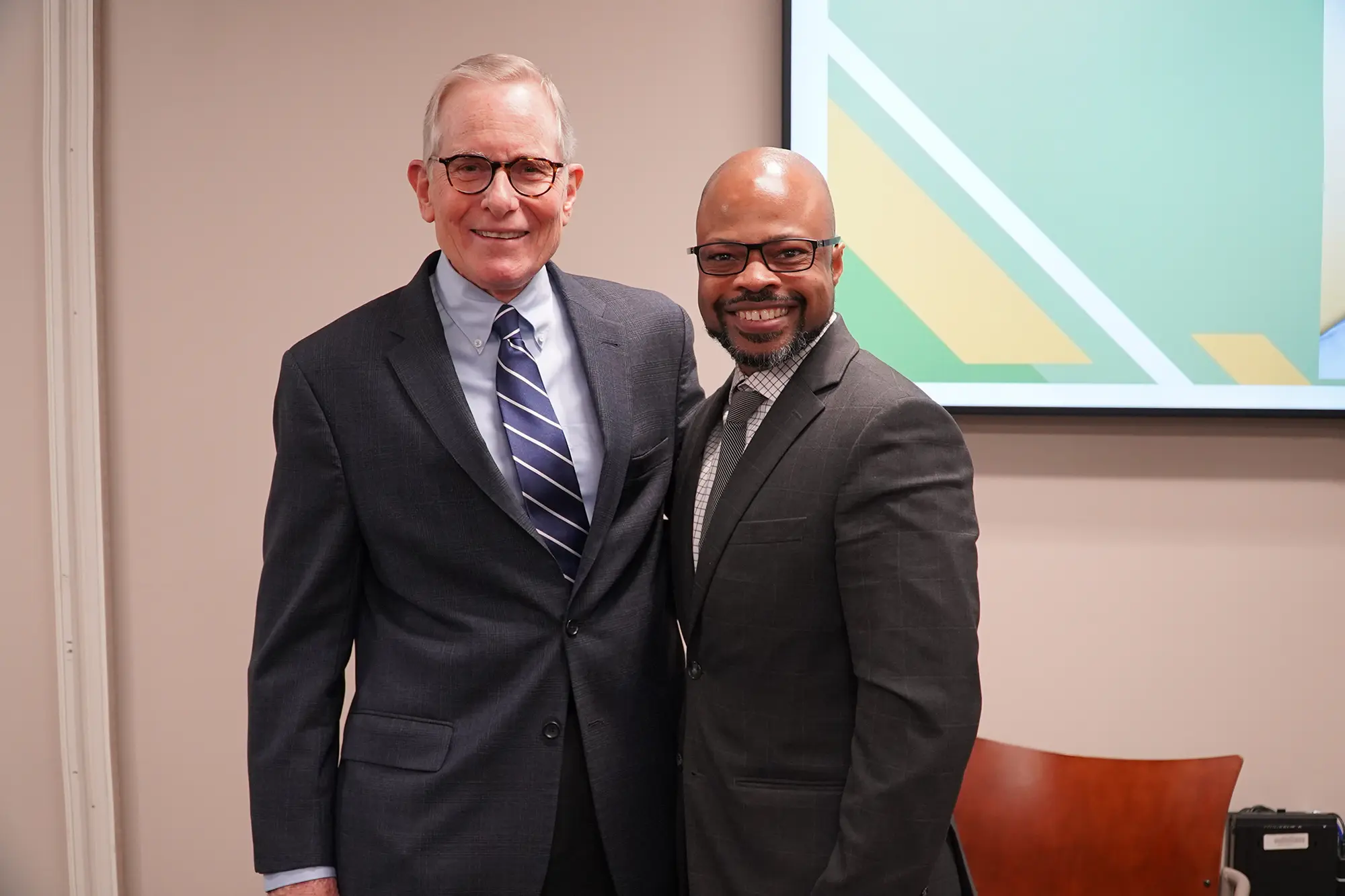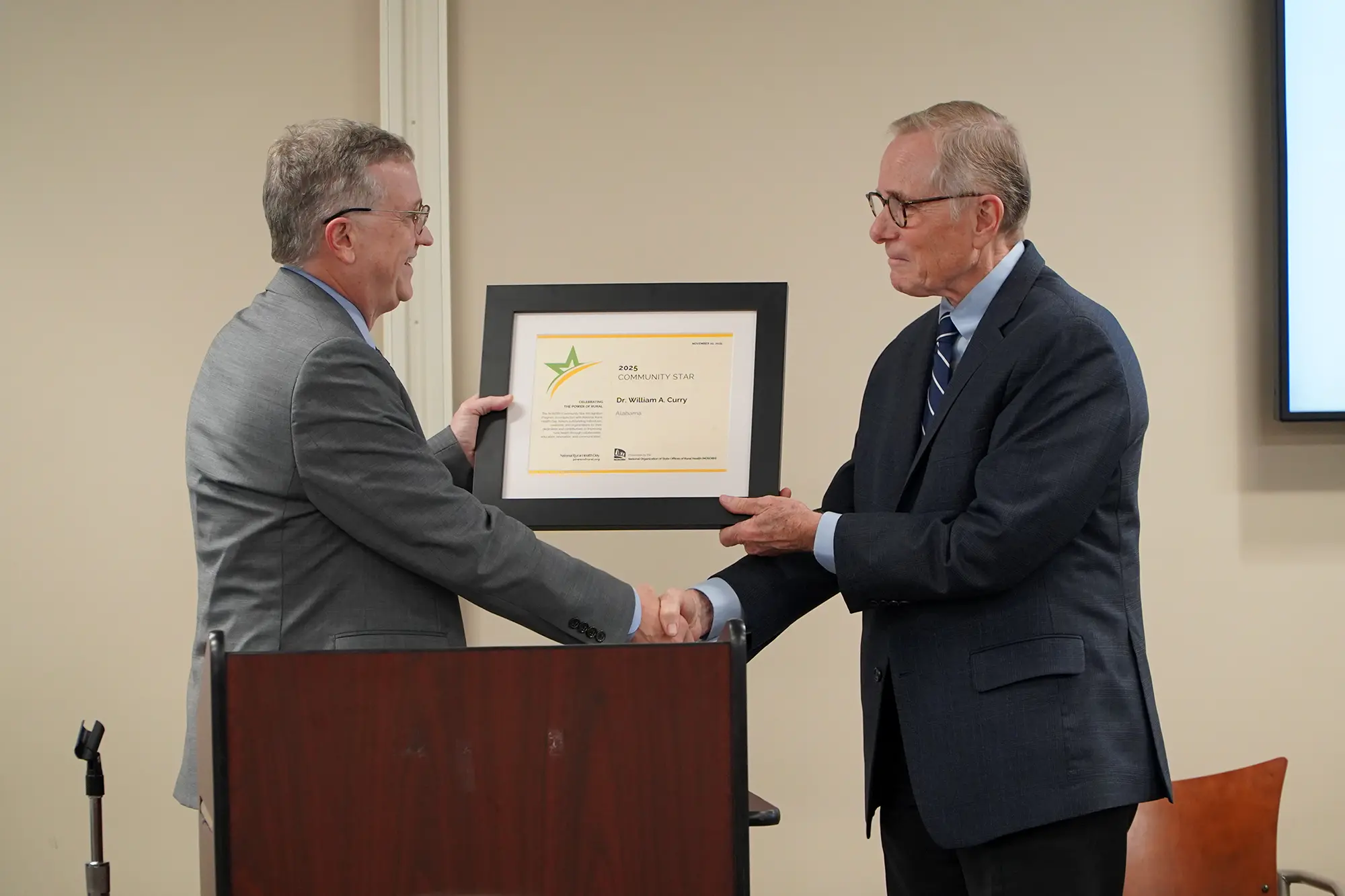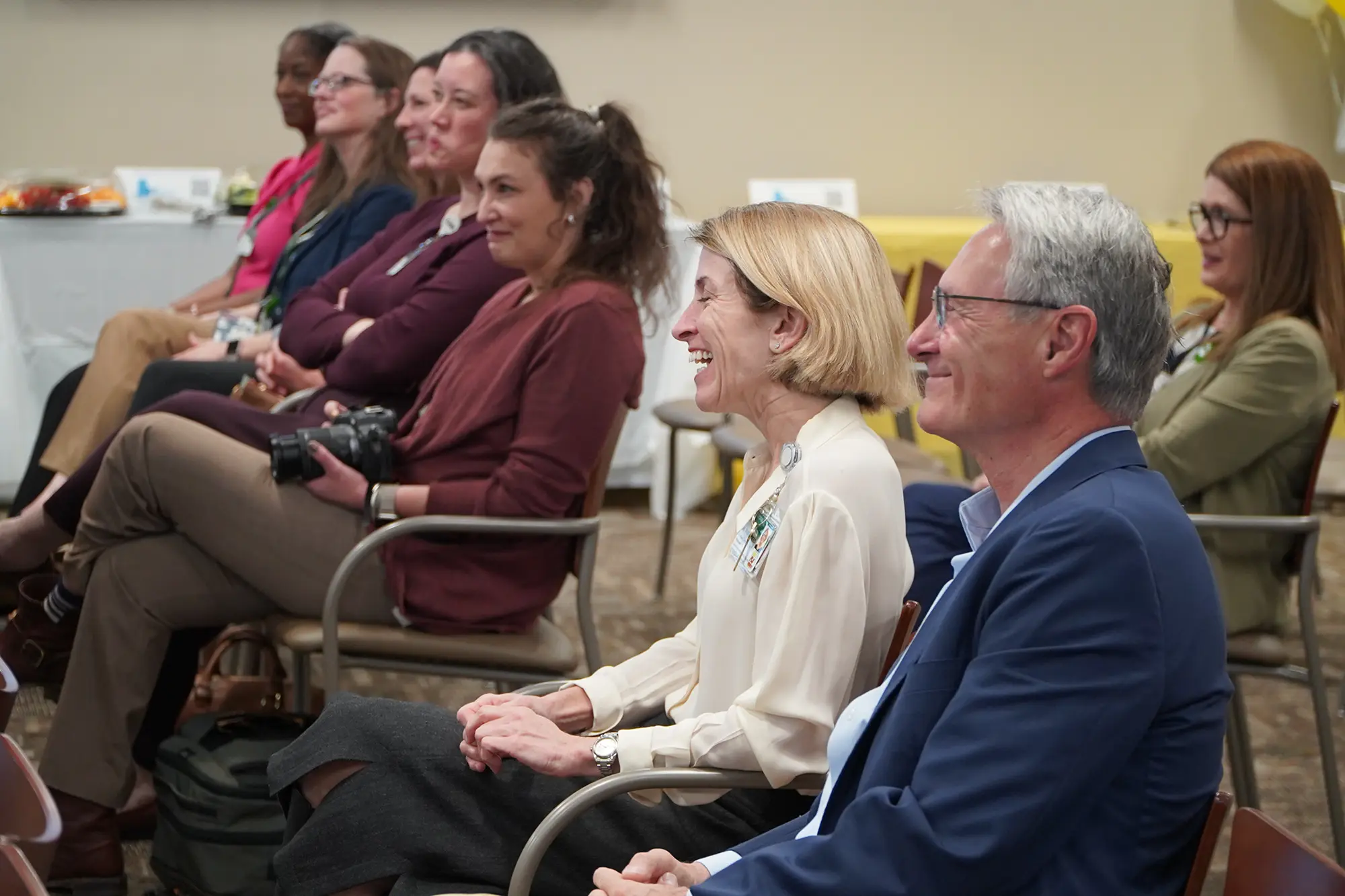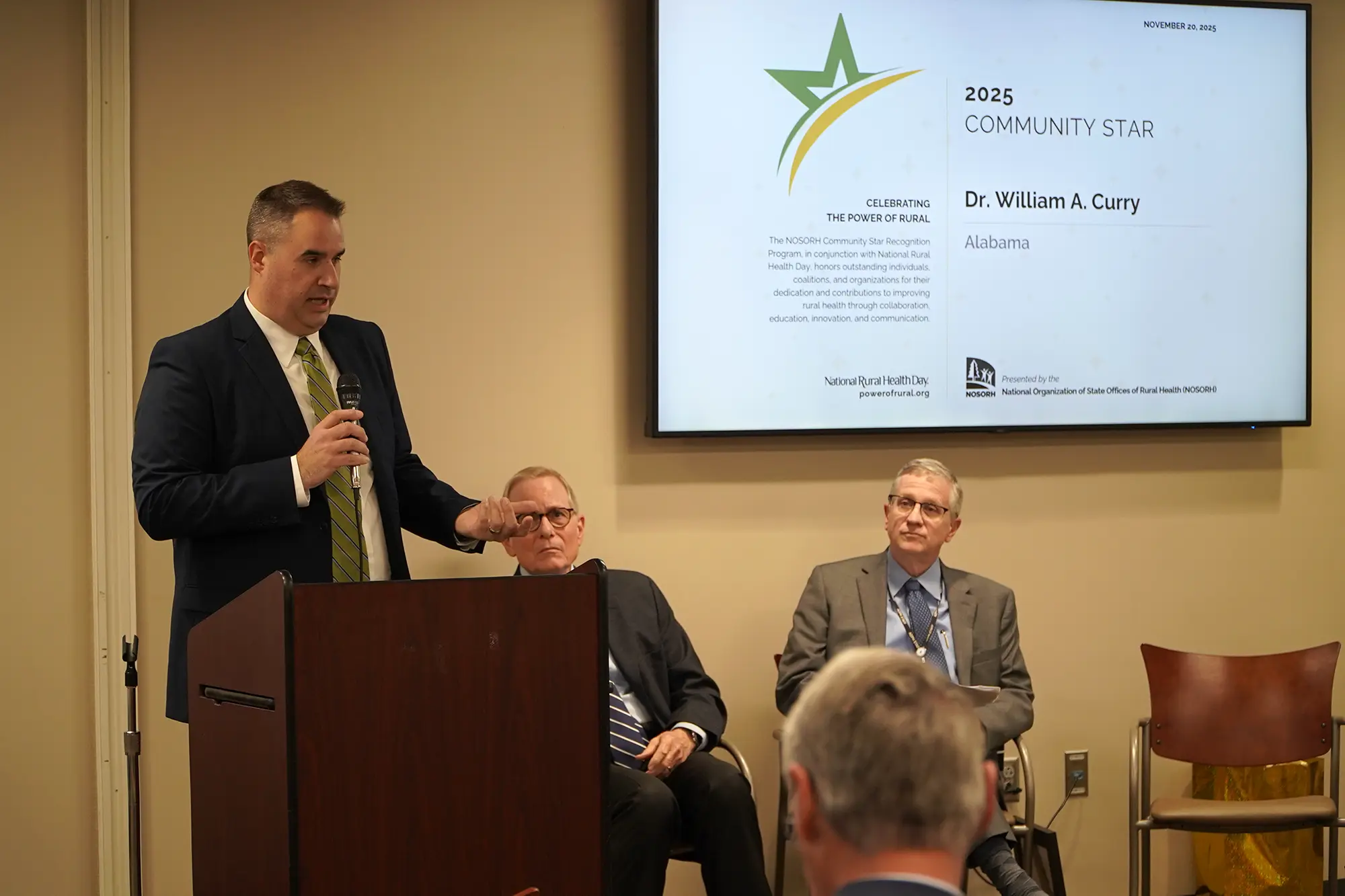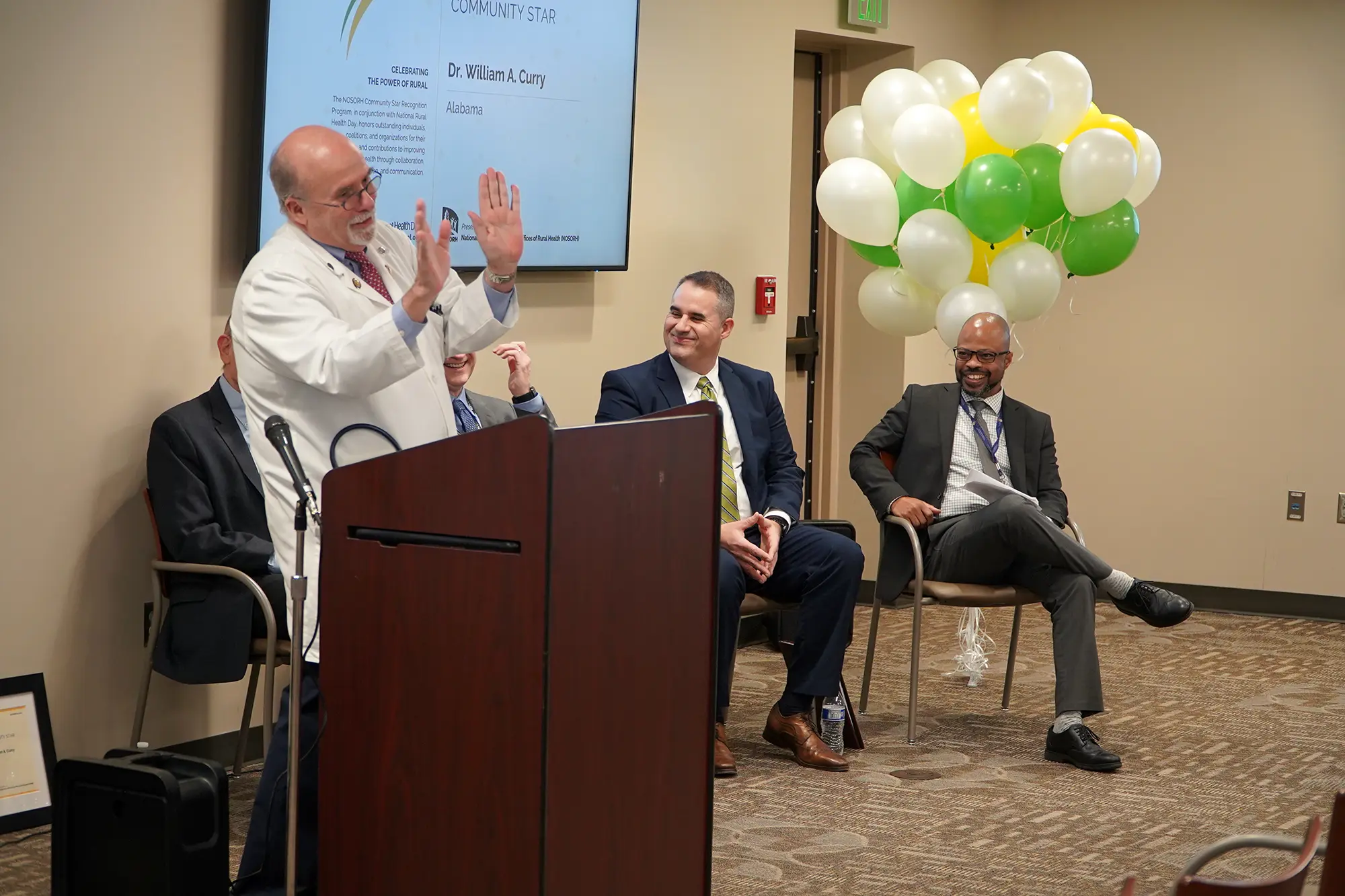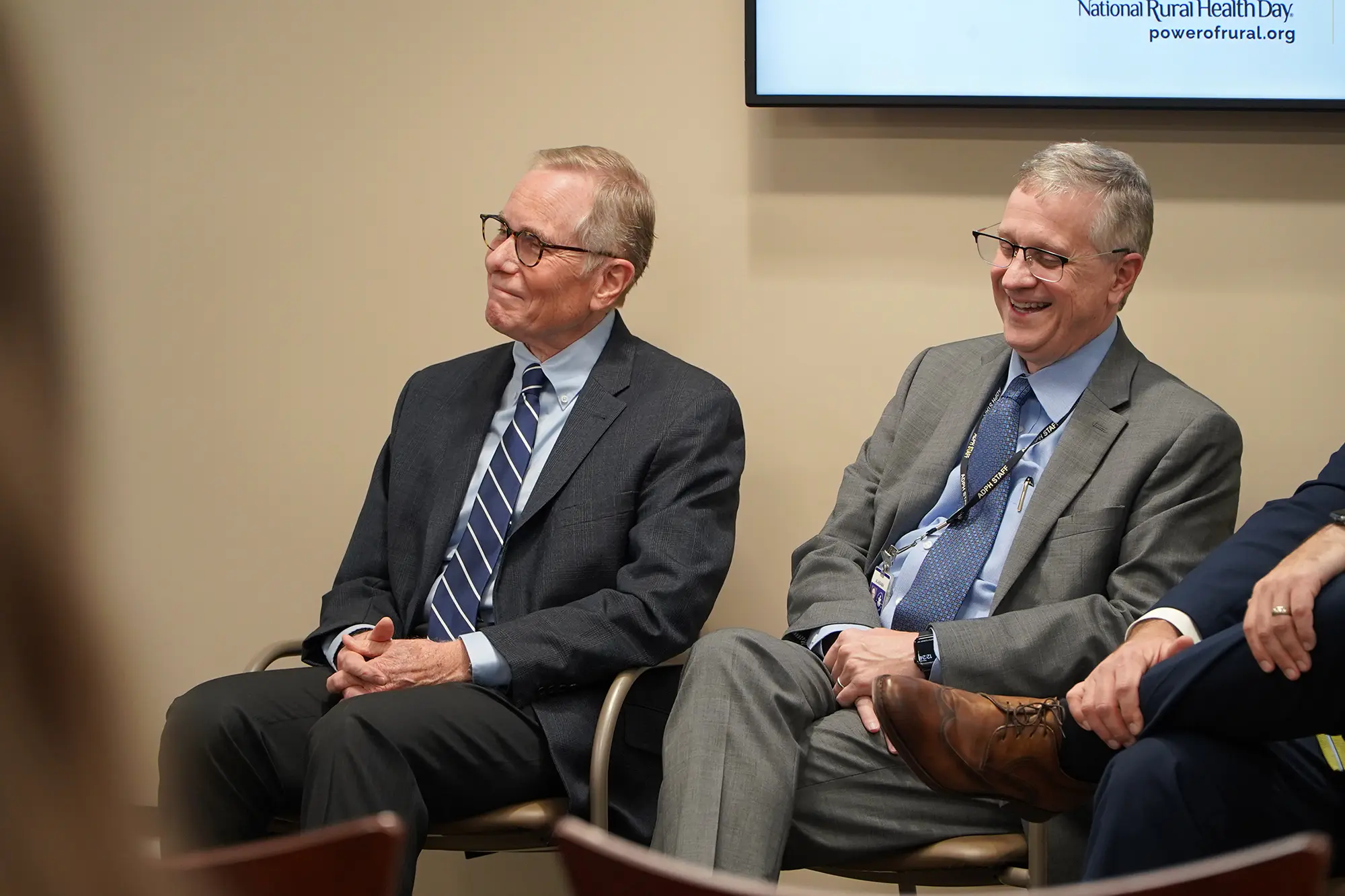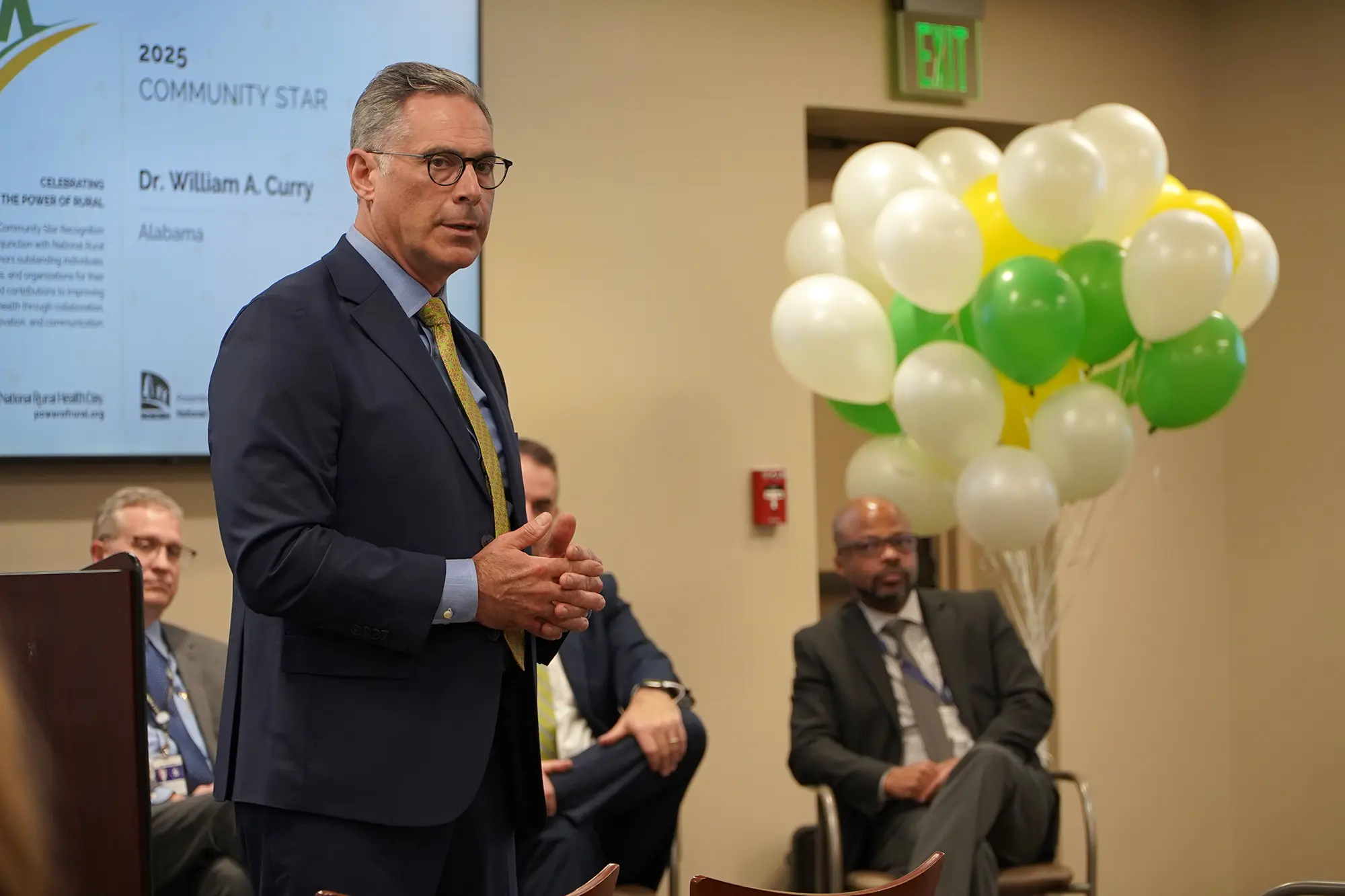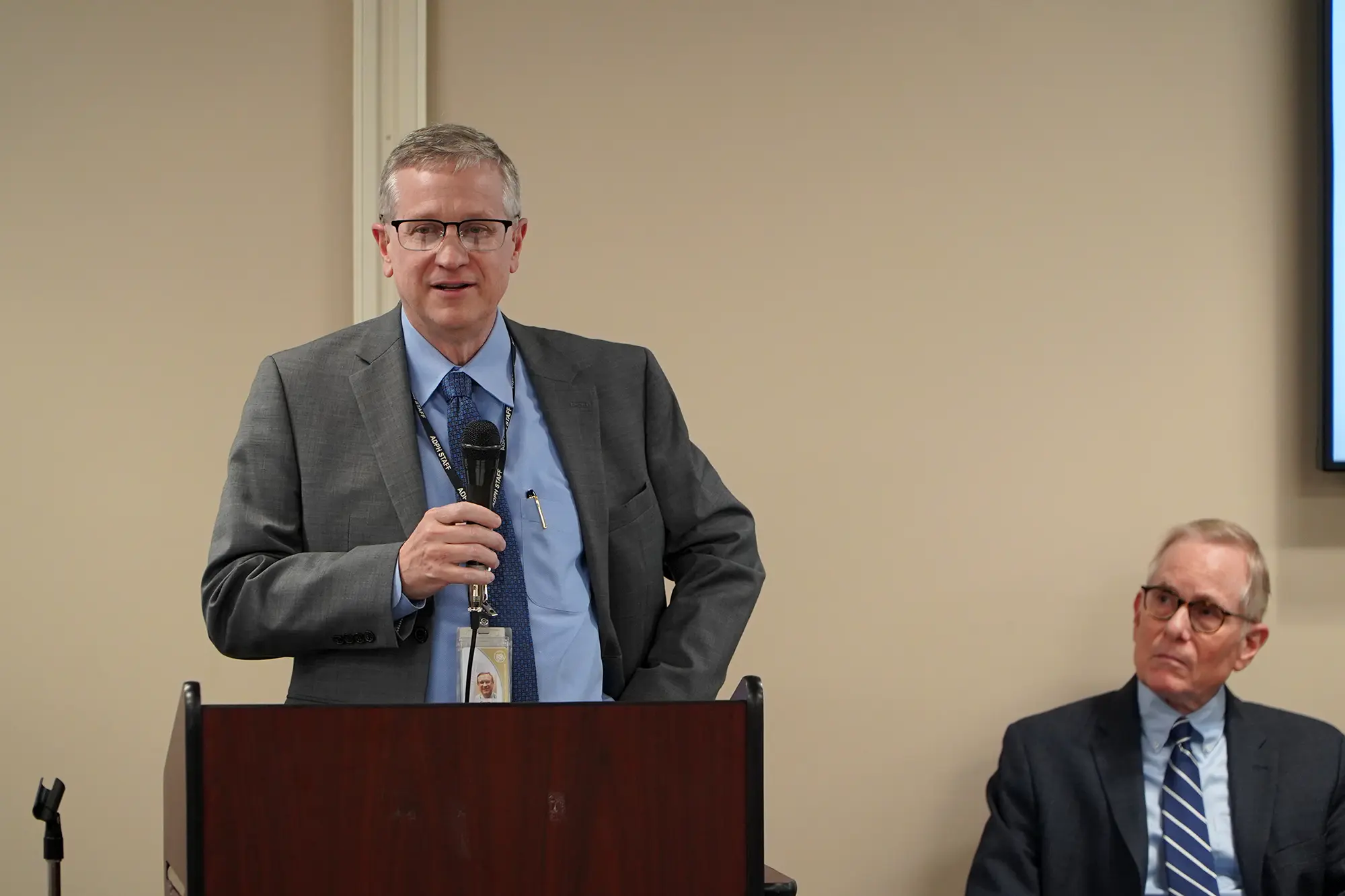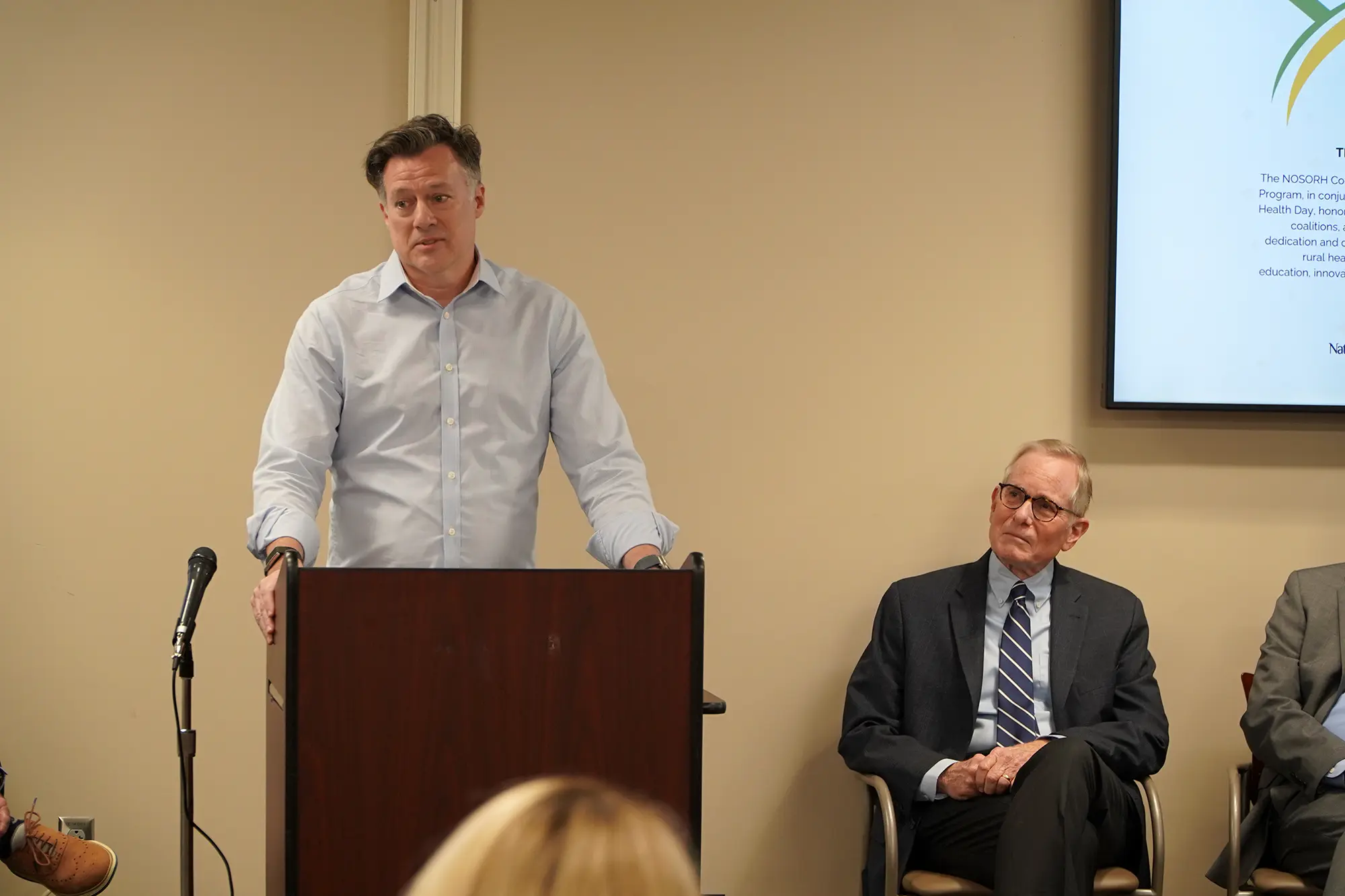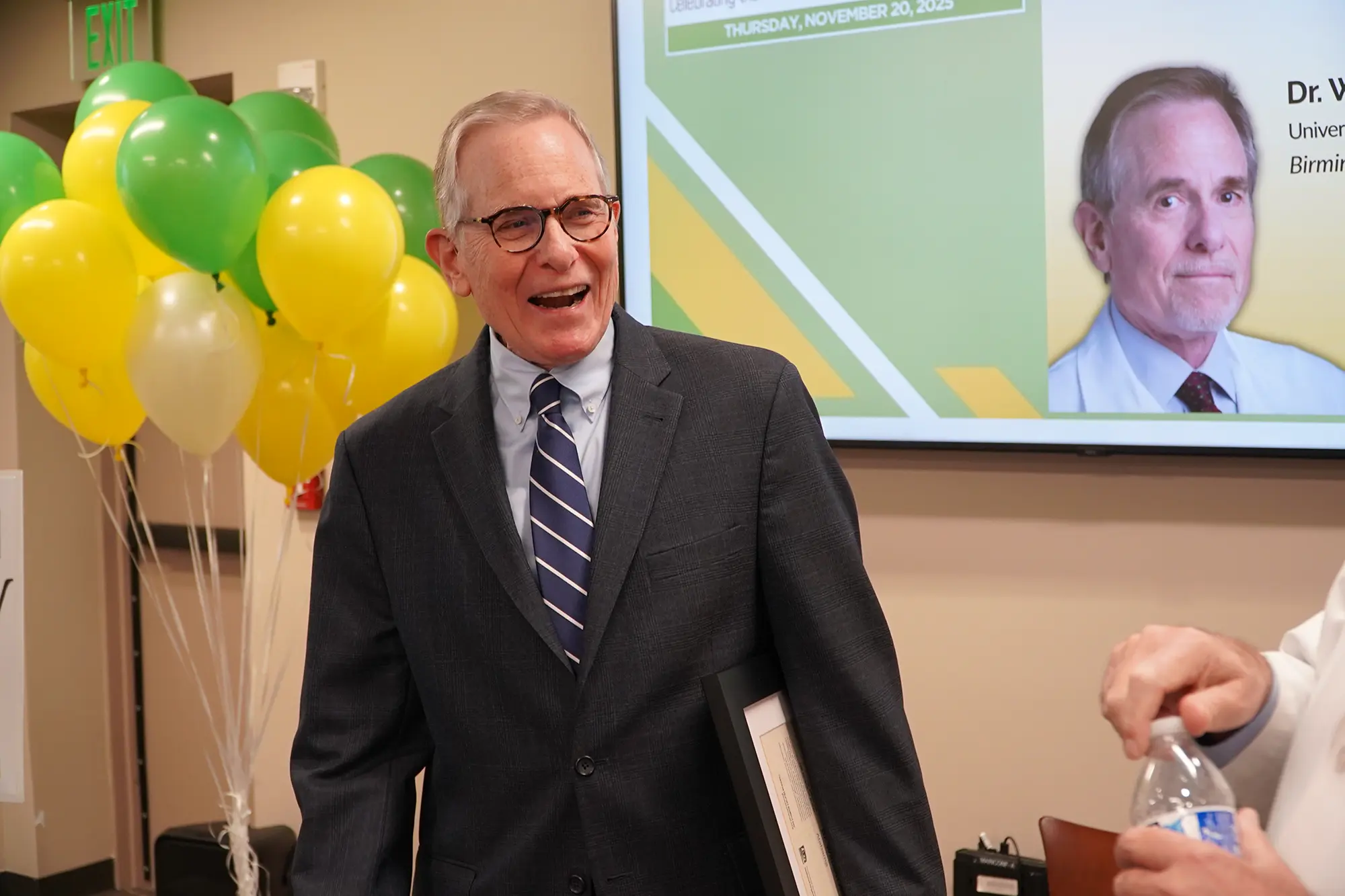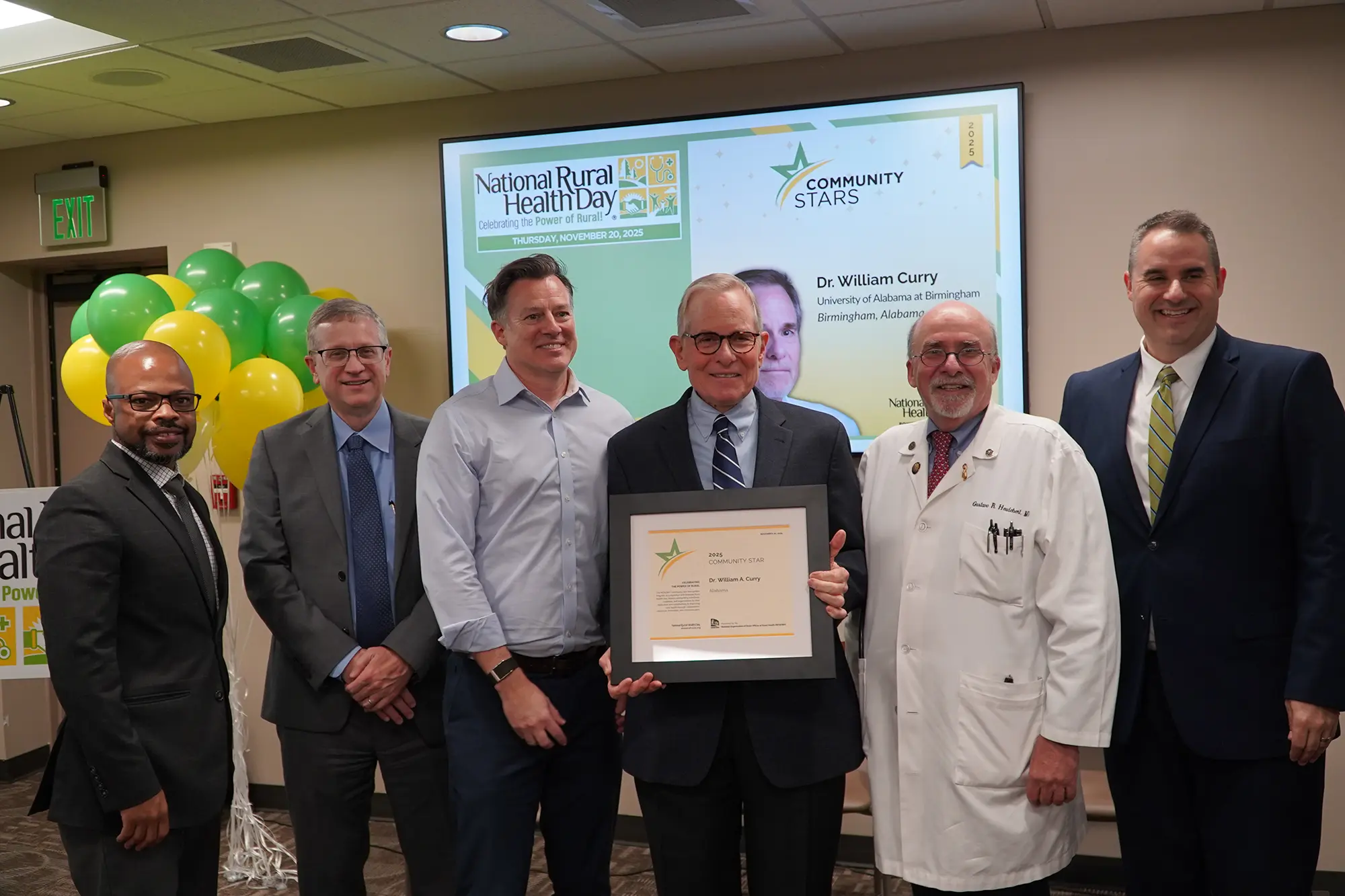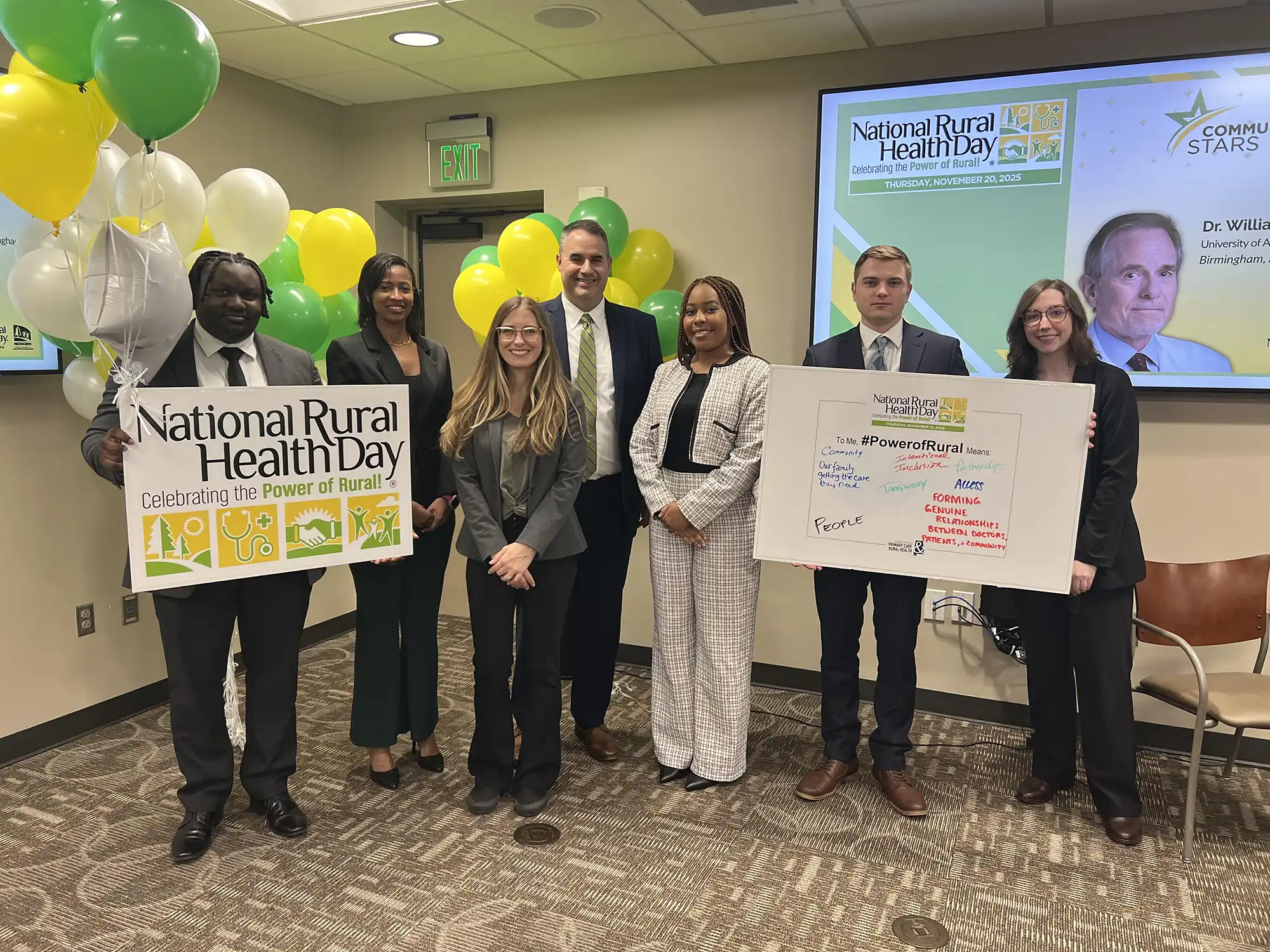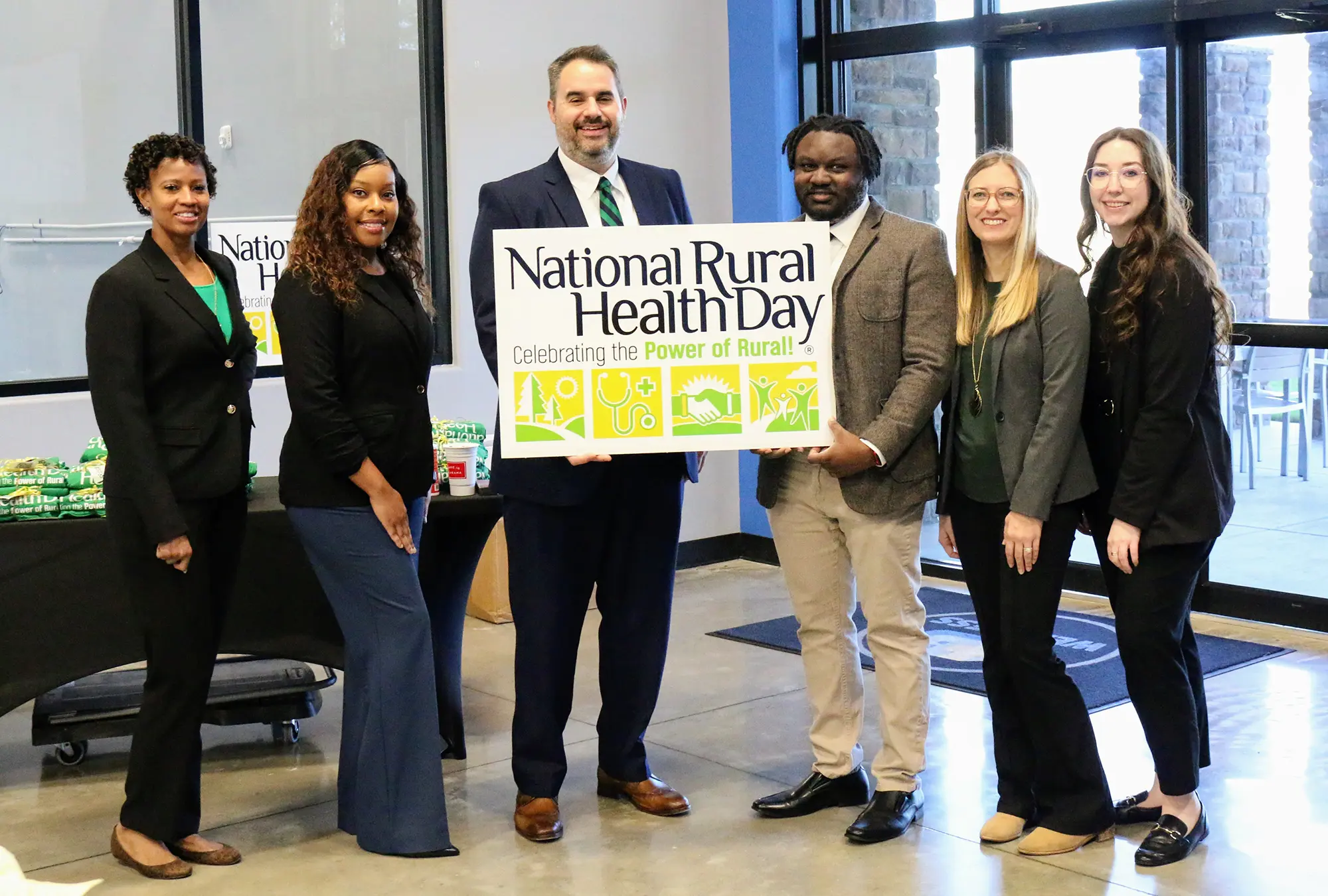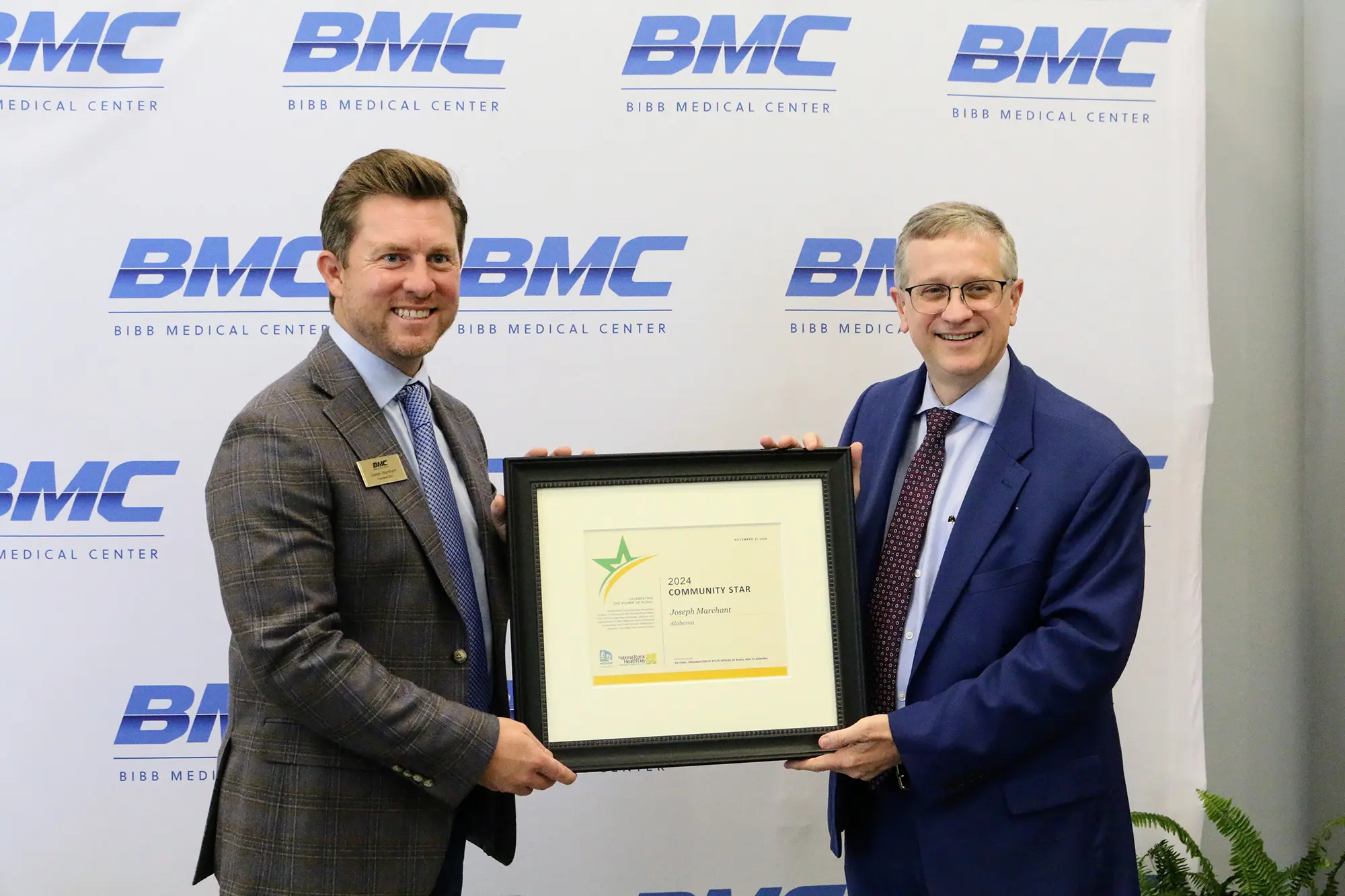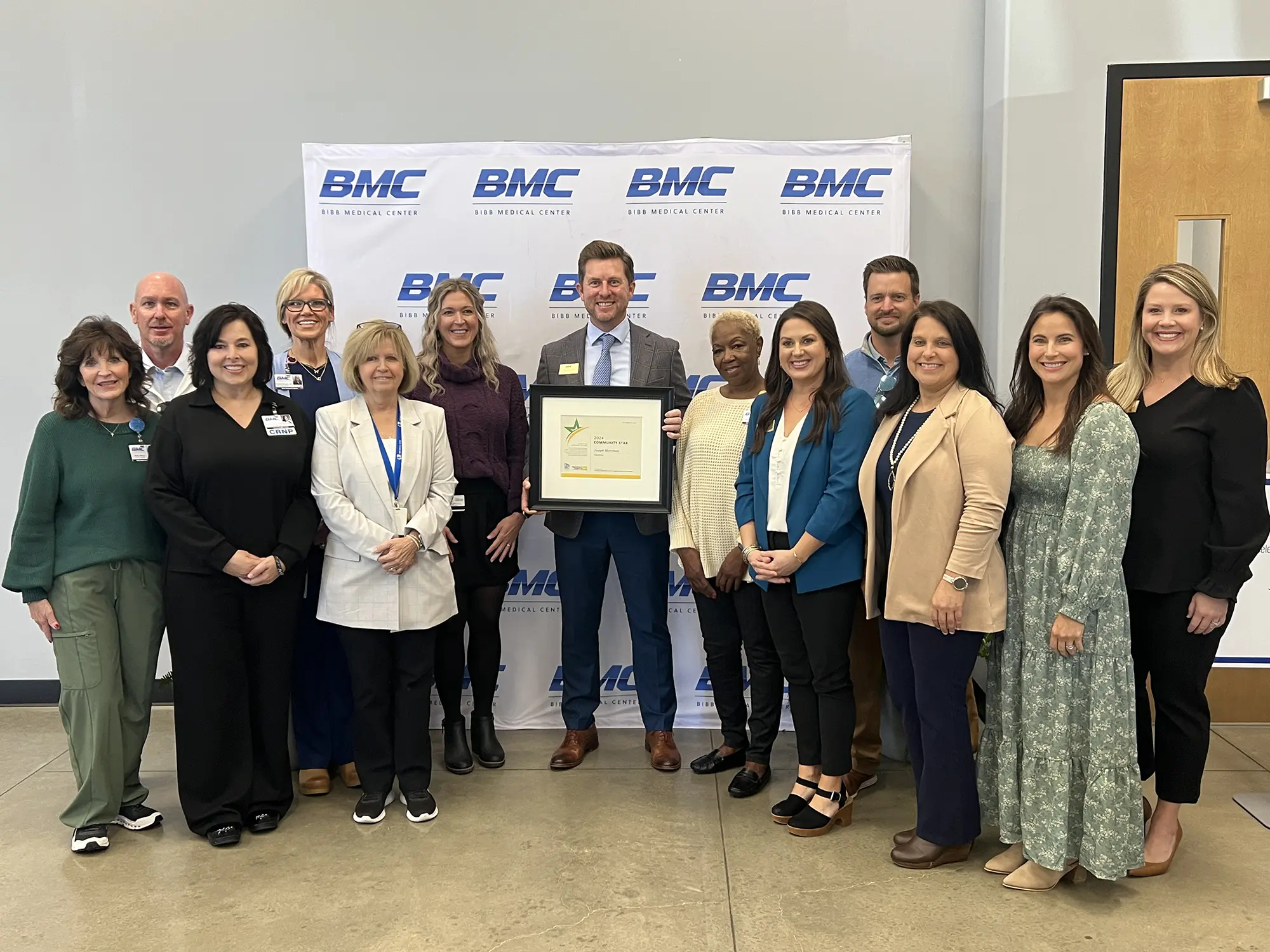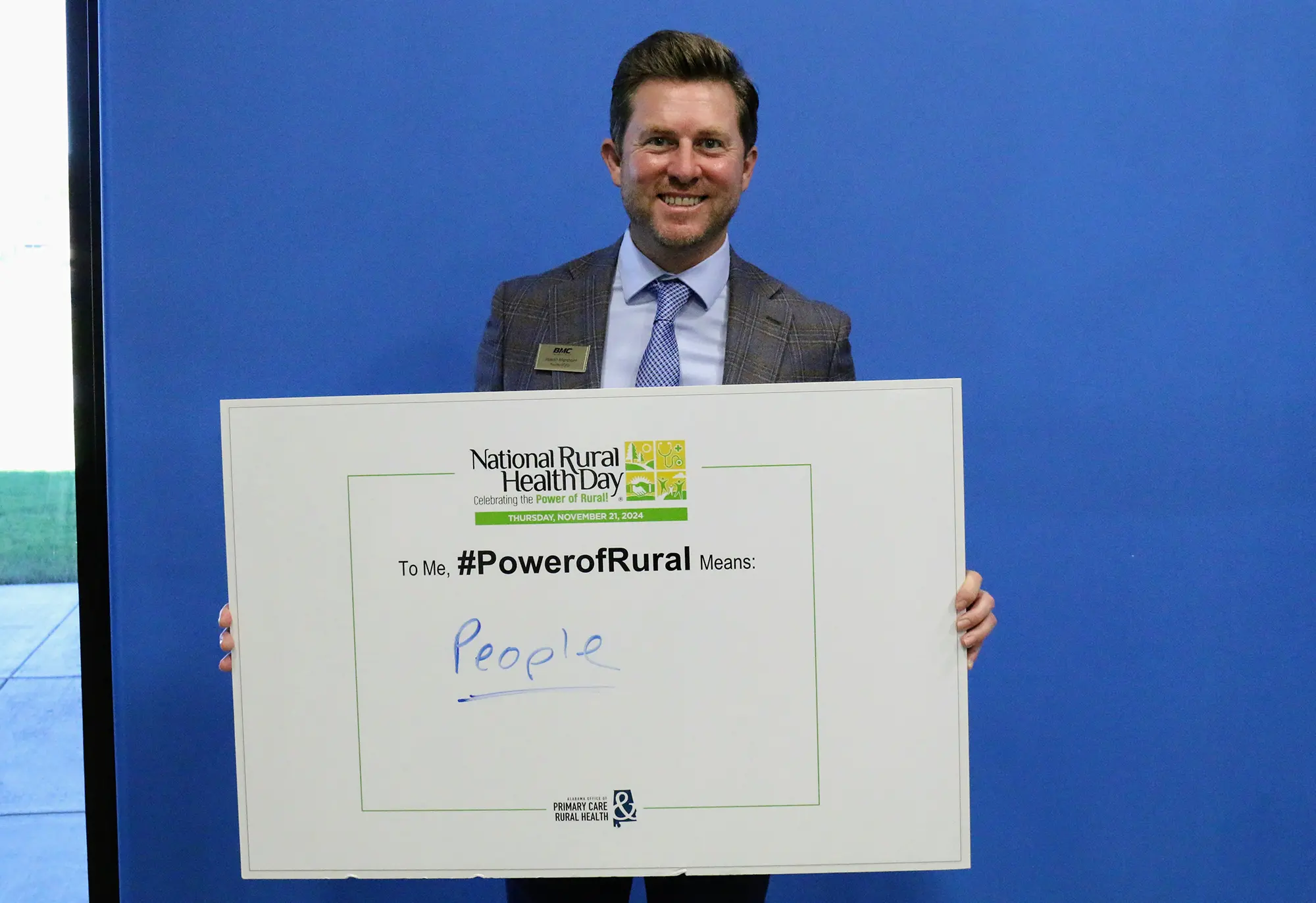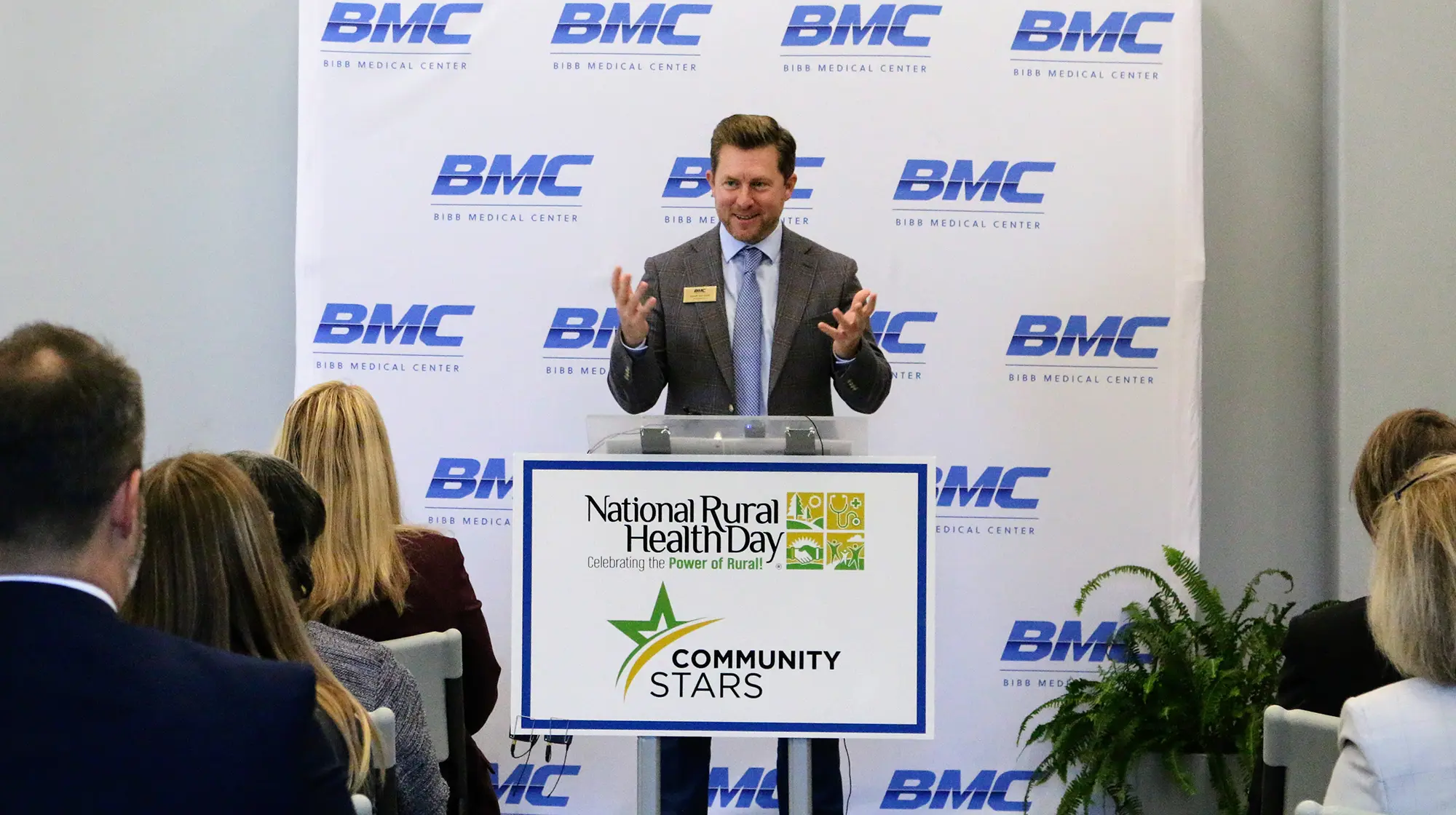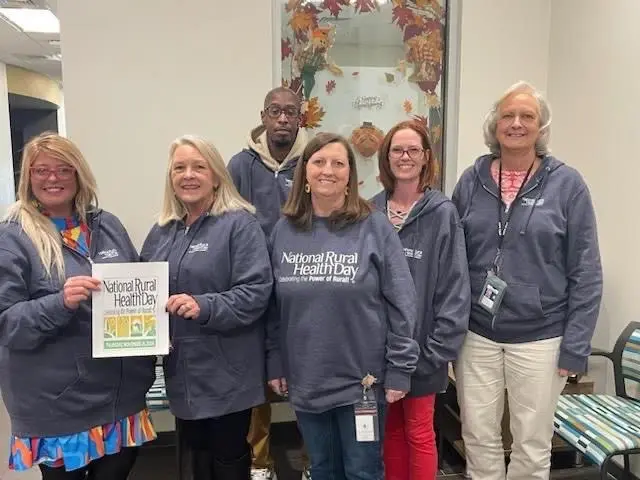- Rural Health Home
- News and Events
- National Rural Health Day
- Conferences/Workshops
- Alabama Flex Grant Program
- Alabama Rural Medical Service Awards (ARMSA)
- At A Glance
- Grant Opportunities
- National Health Service Corps
- Health Data
- J-1 Visa Waiver Program
- National Interest Waiver Program
- Personnel
- Resources
- Rural Health Webinars
- SHIP Program
- Shortage Area Designations
- Telehealth Resources
- Contact Us
SEE ALSO:
Rural Health Recruitment
Alabama Family Practice Rural Health Board
NEED HELP?
Having trouble finding what you are looking for? Use our A to Z Index.
National Rural Health Day
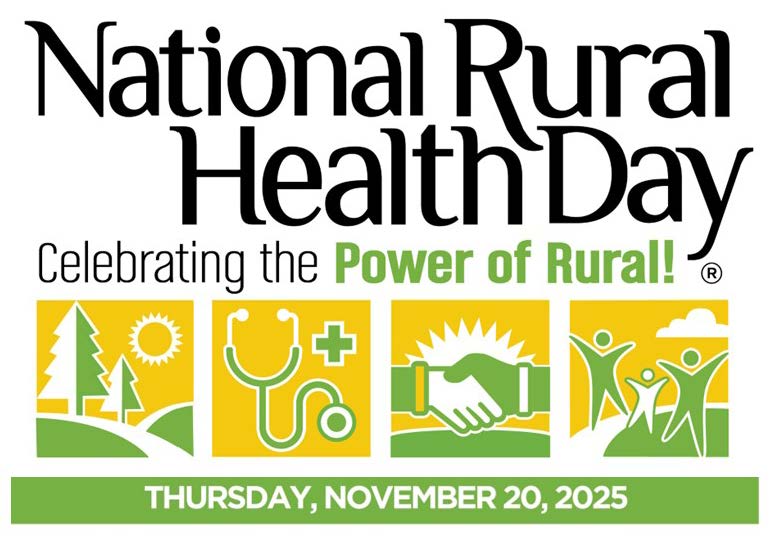 National Rural Health Day is an opportunity to "celebrate the power of rural" by honoring the selfless, community-minded, "can do" spirit that prevails in rural America. The national organization of state offices of rural health sets aside the third Thursday of each November to celebrate National Rural Health Day. This day gives us a chance to bring to light the unique healthcare challenges that rural citizens face and showcase the efforts made by rural healthcare providers and stakeholders to address those challenges.
National Rural Health Day is an opportunity to "celebrate the power of rural" by honoring the selfless, community-minded, "can do" spirit that prevails in rural America. The national organization of state offices of rural health sets aside the third Thursday of each November to celebrate National Rural Health Day. This day gives us a chance to bring to light the unique healthcare challenges that rural citizens face and showcase the efforts made by rural healthcare providers and stakeholders to address those challenges.
Governor Kay Ivey's Proclamation naming November 20, 2025 as National Rural Health Day in Alabama
Review the 2024 Rural Health Day Fact Sheet.
Activity Sheets for National Rural Health Day
Join the "Power of Rural" celebration with these free downloadable tools designed for hospitals, non-profits, and others who serve and support the health needs of rural communities.
- How Do You Stay Healthy? (Coloring Sheet)
- Word Search
- Rural Community (Coloring Sheet)
- Hospital Maze
See also the Promotional Toolkit for more ways to promote National Rural Health Day.
National Rural Health Day 2025
National Rural Health Day 2024
Community Stars
In celebration of National Rural Health Day, the National Organization of State Offices of Rural Health (NOSORH) proudly unveils the 2023 Community Stars! This annual Recognition Program honors remarkable individuals and organizations going above and beyond for rural health. They exemplify the true spirit of collaboration, turning challenges into opportunities, ensuring access to quality care, and fostering a sense of unity and support within our rural communities.
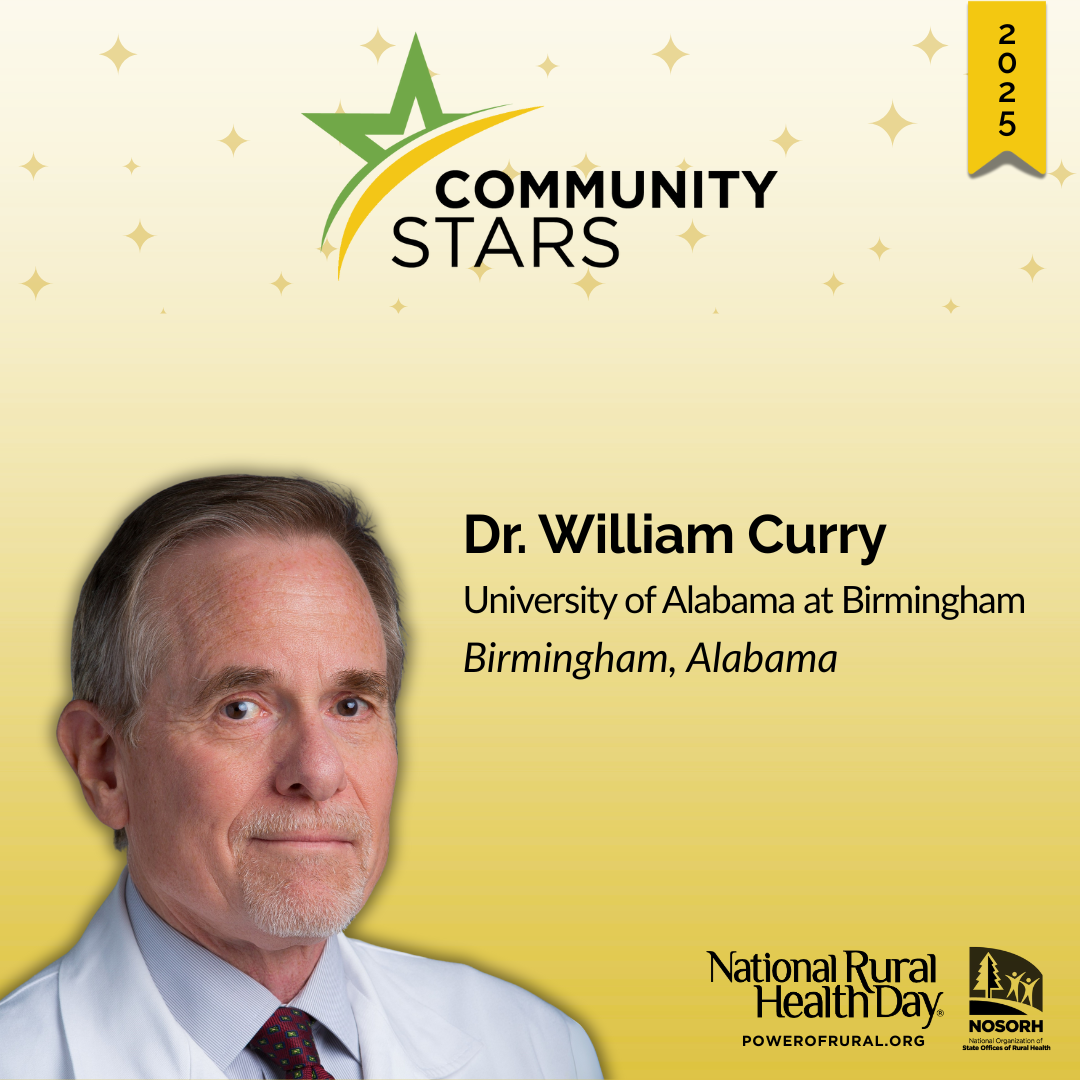 2025 Community Star
2025 Community Star
William A. Curry, MD
Professor of Medicine, Emeritus
University of Alabama at Birmingham
Birmingham, Alabama
Organization website:
Dr. William (Bill) Curry is a highly respected physician who has devoted his career to expanding access to quality healthcare in rural Alabama. Known for his compassion, he has earned the admiration of colleagues, patients, and community members alike. He has received multiple teaching awards and guided countless aspiring healthcare professionals. Dr. Curry's unwavering dedication, professional achievements, and compassionate service make him a true Community Star.
Please describe your role within your organization and your work in rural health.
For 23 years, I served as Associate Dean for Primary Care and Rural Health at the University of Alabama School of Medicine at Birmingham, also working as a clinician educator and population health leader. Prior to that, I practiced internal medicine in my home county of Pickens County, Alabama, serving on the medical staff and hospital board. I also served in leadership roles with the state medical association, focusing on rural initiatives.
How do you and/or your organization make a difference in rural health?
We established two medical school pipeline programs for rural students through our Tuscaloosa and Huntsville campuses -- among the most effective in the country for educating, training, and placing rural physicians. We also founded Alabama's first statewide AHEC program, which remains active and successful. While in Tuscaloosa, we established the institute for Rural Health Research, concentrating on rural disparities and population health.
Describe when you or your organization implemented an innovative approach or program to address a challenge within your rural community.
While practicing in Pickens County, our local hospital found itself without sufficient tax support to be financially solvent. Our medical staff organized a precinct-by-precinct network of citizens to support a sales tax referendum. In the state's sixth poorest county, the tax passed by a wide margin and closed the financial gap. From that campaign, citizens also made clear their desire for obstetrical care, which we restored. Once in double digits, the county's infant mortality rate fell to zero and remained there for years.
What inspired you to pursue a career in rural health?
I began to run out money in medical school, so I took a U.S. Public Health Service scholarship to cover tuition and living expenses. After residency, I repaid the obligation by practicing in my hometown of Carrollton, Alabama, and realized I was called to the challenge and fulfillment of rural practice. That on-the-ground experience convinced me of the need for students and trainees to have similar opportunities.
What does the "Power of Rural" mean to you?
The power of rural people and their communities flows from their values and commitments to one another. Because of scarce resources, distances, and cultural challenges, rural people must adapt, cooperate, and persevere. Despite inevitable challenges, that spirit endures, generation of generation.
What role has your State Office of Rural Health played in supporting your organization?
Yes, throughout the decades! They have been a source of data, information, ideas, and counsel, and have educated us about grants, legislation, and advocacy.
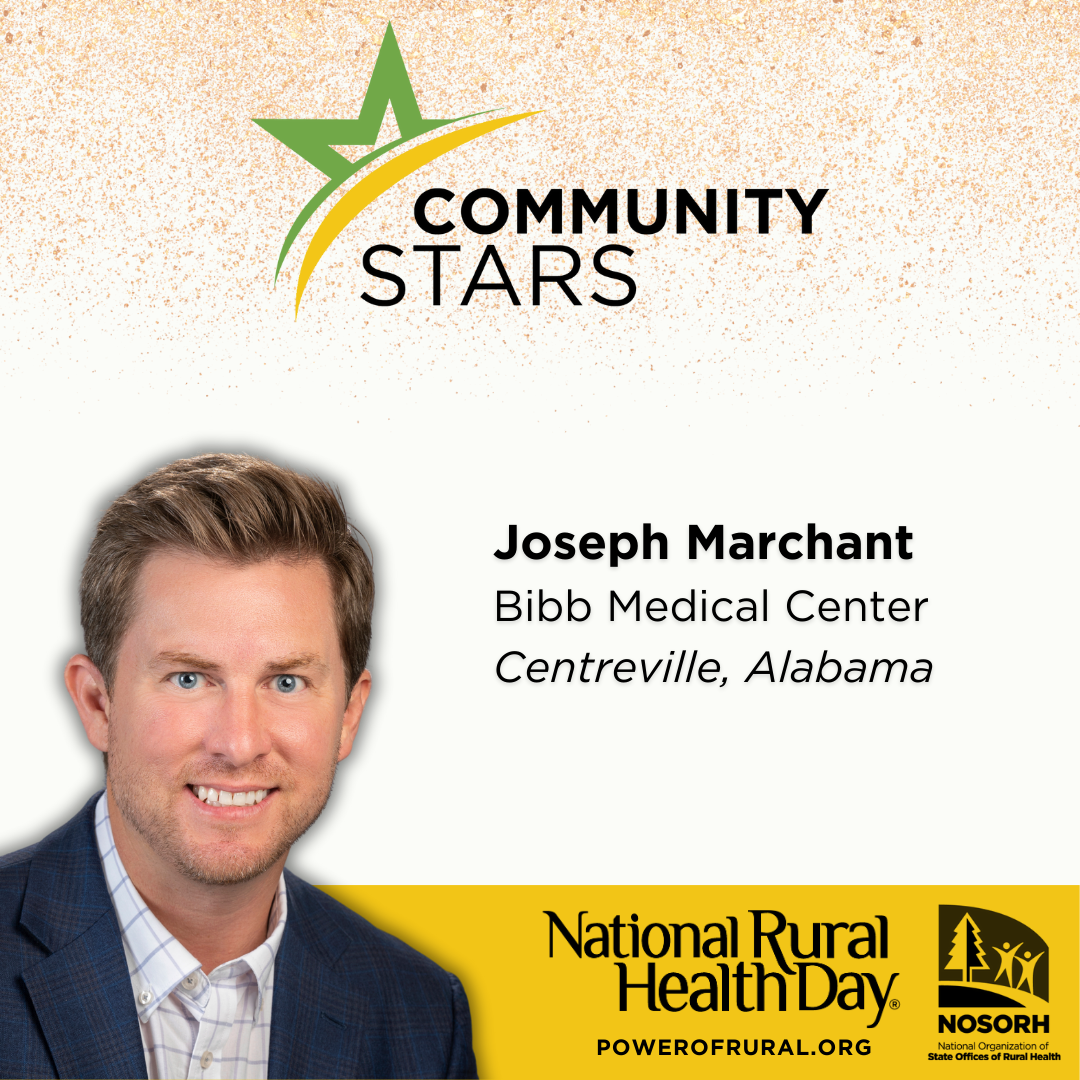 2024 Community Star
2024 Community Star
Joseph Marchant
President/CEO, Bibb Medical Center
Centreville, Alabama
Organization/project websites:
As the President and CEO of Bibb County Health Care Authority, a not-for-profit community hospital based in Centreville, Alabama, Joseph Marchant dedicates his time to providing outstanding healthcare to Bibb County residents while advocating for equitable healthcare access across Alabama's rural communities. Under his leadership, Bibb Medical Center (BMC) reopened its Labor and Delivery Unit after a closure of over 16 years, becoming one of the few rural hospitals in Alabama to offer these services. Joseph also recognized the need for senior living in the region and successfully opened a new Senior Living Facility, achieving 100% occupancy. Additionally, he initiated a farmer's market on the hospital campus, providing fresh, local food to the community, particularly benefiting residents of the Senior Retirement cottages. Whether coaching softball or leading one of the state's most successful rural healthcare systems, Joseph is committed to enhancing the quality of life in Bibb County.
How do you and/or your organization make a difference in rural health?
In a rural West Alabama community devoid of a YMCA or a Boys and Girls Club, we needed to bring opportunities to children in the community and provide a facility that encourages health and wellness for adults and seniors. In 2022, the BMC Wellness Center, a 28,000 sq. ft fitness and recreational facility, opened its doors and has made a significant impact in the community. From senior citizens regaining their mobility in water aerobics to the new recreational programs introduced to local youth, the Wellness Center has enhanced the quality of life for all generations in the community.
Describe a time when you or your organization implemented an innovative approach or program to address a challenge within your rural community.
In rural Alabama, accessing healthcare can be challenging for many residents. Although healthcare services are available, transportation often poses a significant barrier, especially for the elderly population. We envisioned eliminating these transportation barriers by providing primary care directly in patients' homes. BMC at Home was established and now offers primary care services to 300 patients within a 30-mile radius.
Share an example of a successful collaboration or partnership your organization has been part of and how it benefited the community.
There is a significant and ongoing need for healthcare workers across the state, specifically nurses. In 2022, Bibb Medical Center partnered with Shelton State Community College to offer convenient educational opportunities for rural students interested in pursuing a nursing career. This pathway helps eliminate both travel and financial barriers. Since its inception, two cohorts of students have graduated and entered the workforce throughout West Alabama.
What inspired you to pursue a career in rural health?
I believe everyone wants to make a meaningful impact in what they do. Often, there is more opportunity in rural areas to become an integral part of the community.
2023 Community Star
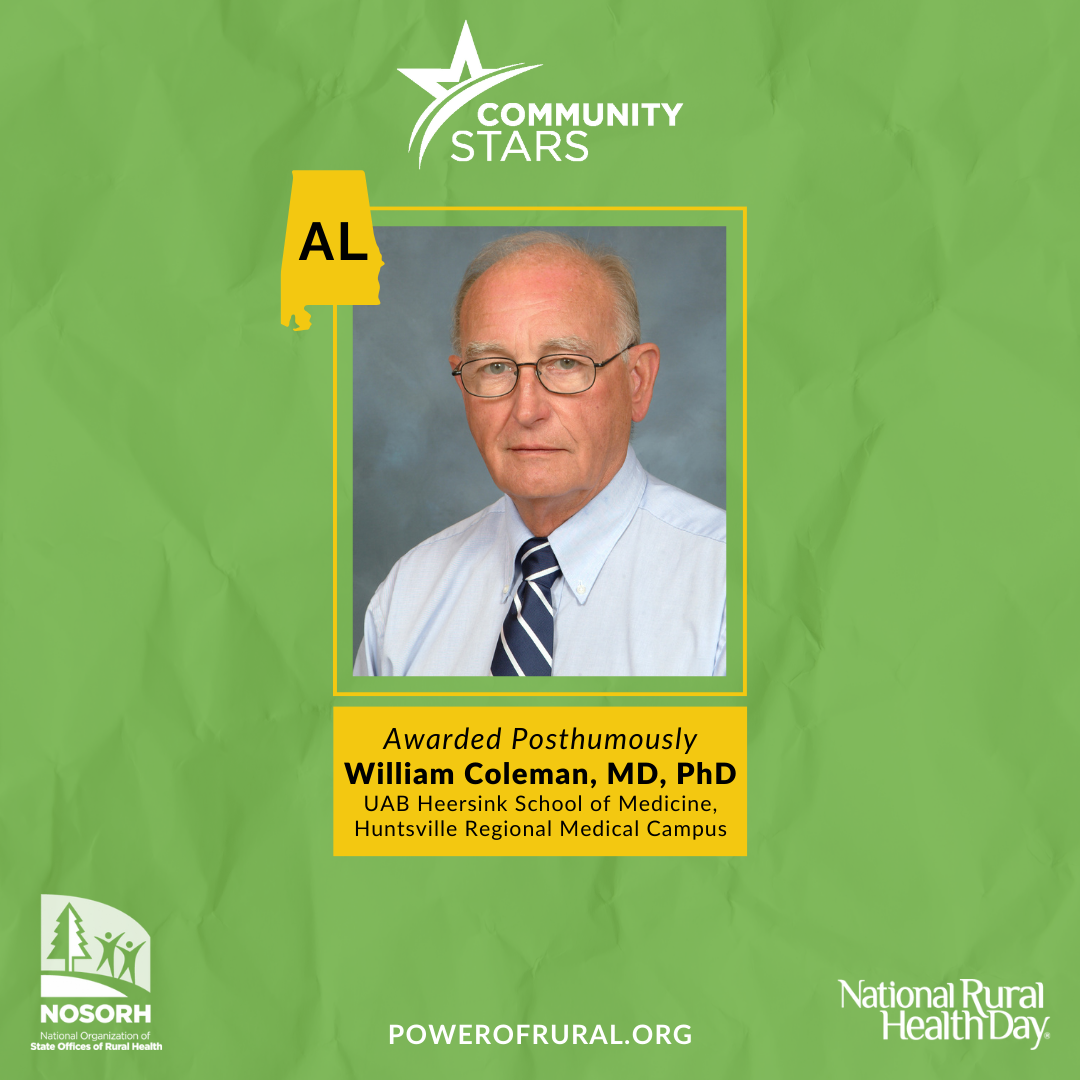 William "Bill" Coleman, MD, PhD (late)
William "Bill" Coleman, MD, PhD (late)
Director, Office for Family Health Education & Research
UAB Heersink School of Medicine, Huntsville Regional Medical Campus
Huntsville, Alabama
Organization/project websites:
What was Dr. Coleman's role within his organization and the nature of his work in rural health?
Dr. Coleman was born and raised in a rural Alabama community (Jemison, pop. 1,000 at the time) and practiced family medicine in the Scottsboro, Alabama community (population 15,000). He lived for 83 years and never called anyplace but Alabama home. He became highly educated, with an MD and PhD; traveled the world pursuing his anatomy PhD research; became national president of the American Academy of Family Physicians; and served on advisory committees for the White House and Harvard University. But what Dr. Coleman was most personally proud of was when a medical school dean pronounced Dr. Coleman as a true "servant leader." To Dr. Coleman, that meant his first and foremost desire as a physician was to serve his patients and his community. In a rural community, he recognized that it was the nature of his profession to support the community in any way he could, just as he relied on the community to support him as the village that helped raise his children and supported his family.
Dr. Coleman established the Office for Family Health Education & Research (OFHER) at the UAB Heersink School of Medicine. The office supports rural medicine efforts with two main projects:
- The Physician Workforce initiative assesses community-by-community need for primary care physicians in rural Alabama. These assessments have recently expanded to nurse practitioners, dentists and psychiatrists. This work made Alabama the first state to completely map Rational Service Areas (RSA) as defined by HRSA.
- The Rural Medicine Program (RMP) admits medical students from rural Alabama with a unique curriculum to educate them on rural healthcare needs and reinforce the role of primary care physicians in rural communities. To date, about 42% of the RMP graduates have become rural Alabama physicians compared to a nationwide average of about 10% of physicians practicing rural medicine. Of the RMP graduates who practice in Alabama, 63% teach rural medical students in their clinics.
Describe a specific project and its successful outcomes or a time when collaboration or innovation was crucial.;
A successful and collaborative project OFHER performs annually is the administration of the Alabama Rural Medical Service Award (ARMSA) in conjunction with the Alabama Department of Public Health's Office of Primary Care and Rural Health. ARMSA exists to place primary care physicians and family medicine nurse practitioners in medically underserved areas of the state through financial incentives in the form of service loans. This project and collaboration were successful, as fourteen physicians and nurse practitioners were awarded $640,000 to practice in medically underserved areas in FY 2023.
Describe challenges the organization encountered and how they were overcome.
A primary challenge in the early years was sustained funding. Dr. Coleman specifically overcame this challenge through proactive and relentless efforts to educate local and state officials across Alabama on the importance of expanded advocacy and pro-rural health policies justified through office data. Dr. Coleman did an excellent job of establishing the novel concept of capturing primary care access via the primary care service area (PCSA) model and explaining its purpose and intrinsic worth for placing physicians in rural Alabama. Due to these extensive efforts over many years, OFHER is fully funded through the Alabama Educational Trust Fund.
Past Community Stars:
Please visit PowerofRural.org to see how you can celebrate Alabama's rural communities and take the Power of Rural pledge.
Page last updated: February 4, 2026
SEE ALSO:
Rural Health Recruitment
Alabama Family Practice Rural Health Board
NEED HELP?
Having trouble finding what you are looking for? Use our A to Z Index.


